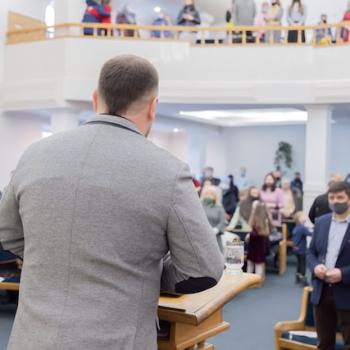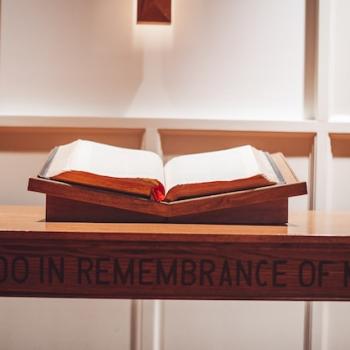
“The Bible is our middle name,” I told the group of college students seated around a table. I smiled as they got it.
It was a literal reference to the name of the church where I was working in college ministry in my twenties. Let’s call it “Faith Bible Church.” “Bible” solidly in the middle.
“We really take scripture seriously,” I said. “It centers everything we do.” The students nodded along.
Taking the Bible Seriously Can Mean a Million Different Things
It all seemed fairly straightforward to me at the time. I wasn’t saying that other churches or Christian organizations didn’t take the Bible seriously. Just that it was one of our defining features as a church. We took it really seriously.
I had yet to fully realize that “taking the Bible seriously”—even really seriously—means a million different things to different people and communities.
It can mean, among other things:
- We read the Bible very literally and tolerate no room for interpretation. We acknowledge no ambiguity in it.
- We read the Bible like a list of instructions—Basic Instructions Before Leaving Earth, if you will (personally, I will not)—and try to do exactly what it says.
- We consider the Bible our only authority, our sole source of truth and guidance.
- We take the Bible seriously as one source of truth and one important guide for Christian practice—alongside other sources, like history, tradition, reason, and experience.
- We consider carefully the historical, literary, and cultural context within which the books of the Bible were written. We try to understand what the writers were really getting at in their own context and what that might mean for us in our contexts today.
- We take seriously the role the Bible has had in harming people, and we want to make things right.
These are only a few options, and they are not mutually exclusive. You might believe one or more of these things. You might believe other things entirely.
We All Have Interpretative Lenses
It’s been helpful for me to realize that many people take the Bible seriously but do so from different perspectives. We read scripture with different interpretive lenses.
Julie Rodgers puts it well in Outlove: A Queer Christian Survival Story, reflecting on her experience in evangelicalism and how her perspective has changed:
“When people say the Bible is their ultimate authority, each person has a different understanding of what the text means, which is largely shaped by the theologians and pastors they trust. I wasn’t aware that I was reading the Bible with an interpretive lens because Evangelicals claimed to have absolute, objective truth. They didn’t acknowledge their positionality, how their context shaped their understanding of the text, or how they read into the Bible just as much as they read from the Bible.”
Our contexts shape us. Our understandings are shaped by the people we have listened to, the people we have considered sources of authority in our lives.
This includes theologians and pastors, as Rodgers writes—and also parents and family members, church elders and deacons, grandparents and aunts and uncles. Authors we read, podcasts we listen to.
Any or all of these people may have wise and good things to say. But each of them operates with their own interpretive lens. None of them has access to—let alone a monopoly on—anything remotely approaching “absolute, objective truth.”
This ambiguity might evoke a crisis of authority. That is okay. It can be good, even. It just needs to be acknowledged. We don’t get anywhere intellectually honest—or spiritually real—by pretending we don’t “read into the Bible just as much as [we] read from the Bible.”
Taking the Bible Seriously—And Our Limitations, Too
I no longer go to a church that has “Bible” as its middle name. The ways people at my current (more progressive) church read scripture are very different from those of the evangelical church of my twenties.
To be honest, I see pros and cons to both approaches. There are things I miss about the verse-by-verse sermons the pastors at “Faith Bible Church” preached. And there are things I think those pastors were missing.
The interpretive lenses through which I view scripture have changed over the years. And I think that’s a good thing. I hope these changes have made me more open to other people and the lenses they bring.
Really, many different kinds of people and faith communities “take the Bible seriously”—really seriously—in different ways. And the Bible is best read in diverse communities of people who are there to learn with and from one another.
We can take the Bible seriously—but also take seriously our own limitations. Our own biases. Our need for others alongside us in a context where we can all help one another grow.
We can lay down our claims to absolute truth and wrestle with scripture with open minds. And we can embark on this journey in community.












